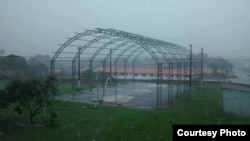Gymnasiums without a ceiling, some classrooms with leaks, others without electricity - those are reports about Brazil's public school system from students in different parts of the country.
Brazil, in the midst of a political and economic turmoil, is now facing its own Occupy Movement in public schools, where high school students have taken over more than 300 public spaces and formed committees to demand meetings with state officials.
In the states where the movement is centered, students want officials to open a parliamentary commission of inquiry to investigate alleged misappropriation and embezzlement of money that had been earmarked for the education sector, such as the funding of classrooms and school lunch programs.
The government has not identified the number of schools occupied. But the movement, which started last year in Sao Paulo, has now spread to Rio de Janeiro, Ceara, Para, Mato Grosso and Rio Grande do Sul.
In occupied high schools, students rotate among themselves chores ranging from cleaning to scheduling all-day activities that involve music and art.
Rio de Janeiro
In Rio de Janeiro, the host city of the Summer Olympic Games, teachers have been on strike for more than three months.
“Rio de Janeiro is broke. Rio is in a situation of despair,” said Lucia Adedoyin, a parent and Rio de Janeiro resident.
Classroom conditions deteriorated to such an extent, she said, that students decided to occupy their high schools. No classes will be held until the state government listens to students' frustrations and demands.
“Teachers are not getting paid… and these Olympic Games brought the state of Rio de Janeiro into the abyss,” she said.
By January, the price tag for the 2016 Olympics in Rio de Janeiro had risen by 400 million reais ($99 million) from August, mainly because of the increasing costs of supplying temporary power and seating at venues. The projected total cost for the Games, including large infrastructure projects including an extended subway system and reconstructed port area, was projected at 39.1 billion reais ($11.5 billion).
In a statement to VOA, a Rio education official said the department is committed to have a dialogue with students, teachers and organizations.
Last week, a Brazilian judge ordered classes to resume immediately in Rio. According to Judge Gloria Eloiza Lima da Silva, the student movement cannot bar other students and teachers from accessing school premises. The protests are not prohibited as long as participants respect court orders, she said.
O Globo reported that a parent criticized the judge’s decision, saying the order would not matter because teachers are still on strike. “We, as parents, want classes to resume,” Ana Lucia Victer told O Globo, “The problem is that only a few teachers are not adhering to the strike.”
Other regions
In Rio Grande do Sul, a state in the southern part of Brazil, more than 170 schools are occupied, and some have been closed for more than a month, students say.
Rio Grande do Sul government officials sent a letter to students in occupied schools giving them 48 hours to vacate school premises. The student association then filed a motion in the state’s district court saying there is no such thing as repossessing something that belongs to taxpayers, said Fabiola Loguercio, director of communication at the High School Union Association (UBES) on Wednesday. Teachers in Rio Grande do Sul also are on strike.
“This is the first conversation we’re having with officials… the government has presented guidelines and said they would help and accept our demands, but they do not give a deadline,” Loguercio said.
In Mato Grosso, a state in the western part of the country, students were scheduled to set an agenda to discuss their demands with officials as long as government officials withdraw public notice to discuss plans to privatize public schools.
"We have more than 2,000 students involved in the Occupy Movement,” said Juarez França, student and president of AME - the student-led organization behind the school occupations in Mato Grosso.
In the northern region, Rafael Galvao, student and director of UBES-PA - another student-led association, said the movement has just begun in the state of Para. Besides complete education reform, students want pest management to handle pigeon infestations in schools and a school lunch program to benefit all students.
Galvao said members of UBES-PA have met with officials from the state’s Department of Education. He said a document was signed in which officials committed to meet students’ demands.
“So we are waiting. If they don’t do what was promised, we will occupy again,” Galvao said.
Over the weekend, Galvao visited Marapanim, a rural small town in Para, and said he was “touched” when he visited an occupied school that serves at least 1,200 students.
“It’s sad. It looks like a prison... Without any structure, no food, no transportation. I held tears back when I heard the students’ account,” Galvao said.
Brazil's Ministry of Education spokesperson told VOA that because high schools are under the jurisdiction of state governments, ministry officials prefer to "not comment at this moment."








